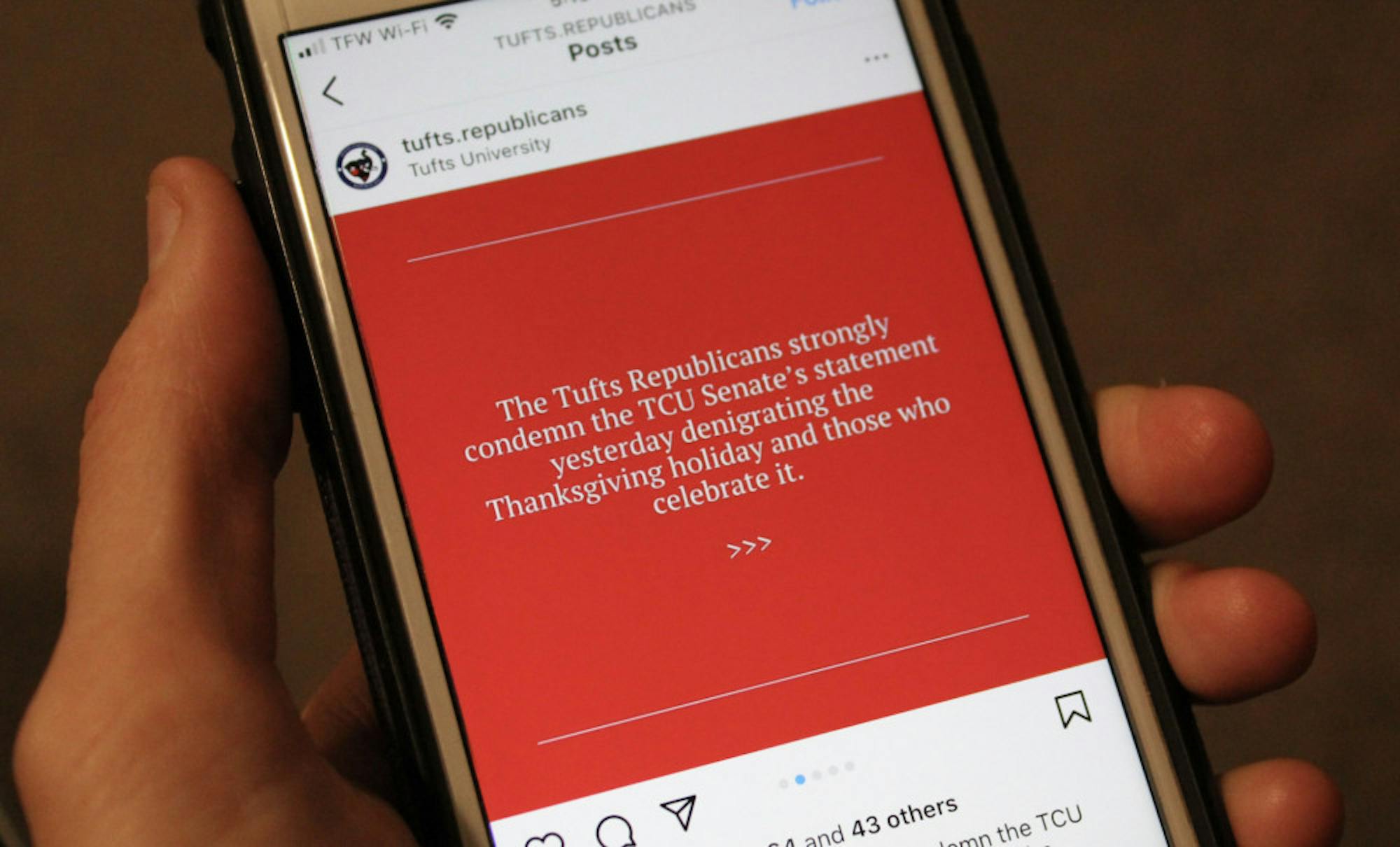The Tufts Republicans issued a statement on Nov. 23 accusing TCU Senate of spreading hateful and divisive rhetoric in their post about the National Day of Mourning and the history of the Thanksgiving holiday.
TCU Senate had posted the statement to their Instagram the day before, sharing two slides titled “National Day of Mourning 2022.”
“In the past, TCU Senate has used terms like ‘thanksgiving’ to refer to Fall Break thereby commemorating the genocide of Indigenous People,” TCU Senate wrote in the Instagram post’s caption. “We acknowledge the erasure and harm done and want to move forward to describe it as Fall Break.”
“As you may have noticed, we as a Senate have made active steps to rename certain programming and events out of respect to National Day of Mourning,” they continued in their statement.
The Daily reached out to TCU Senate for comment, but they were not able to comment at this time.
In response, Tufts Republicans argued that Thanksgiving is a unifying holiday, and criticized TCU Senate for “denigrating” the day and its celebrants.
“Contrary to the TCU Senate’s statement, we know that Thanksgiving is not a ‘commemorat[tion] of genocide,’” their statement said. “The TCU Senate’s choice of words work to deepen divisions in our society instead of bringing us closer together. Furthermore, these ideas don’t represent those of Tufts students as a whole.”
Tufts Republicans also called upon the university to take action against TCU Senate for their post.
“We call upon University leaders to condemn this hateful rhetoric from the TCU Senate and demand that they apologize to the Tufts community for suggesting that those who celebrate such a deeply-held cultural tradition are supportive of genocide,” the statement said.
Despite these calls, the administration has not and does not plan to admonish TCU Senate for the post.
“This is an opportunity for students to engage in dialogue with each other about issues on which they disagree,” Patrick Collins, executive director of media relations at Tufts, said. “There is no need for the university to mediate this disagreement.”
Both the TCU Senate post and the Tufts Republicans post received considerable attention, garnering 76 and 180 comments respectively as of Dec. 6. Comments on TCU Senate’s post were mixed, while the majority of comments on the Tufts Republicans’ statement were critical.
The Daily reached out to the Tufts Republicans for comment, but they declined to make any additional statements.
TCU Senate’s post directed readers to visit the pages of the Tufts Indigenous Center and the Indigenous Students’ Organization at Tufts for more information about the National Day of Mourning, a day of remembrance observed by Indigenous people and allies of the community who do not want to celebrate the arrival of the Pilgrims at Plymouth Rock.
“National Day of Mourning… is an annual demonstration held on the fourth Thursday in November that aims to educate the public about the true history of so-called ‘thanksgiving,’” TCU Senate’s statement said. “It also seeks to raise awareness toward historical and ongoing struggles facing Indigenous People today.”
While the Tufts Republicans’ statement did not deny violence against Indigenous people, it said that the holiday should still be observed, arguing that it honors the contribution of the Native people to the colonists’ survival.
“While there is most certainly a time and place to discuss our country’s stained past, erasing the inspiring actions of Indigenous Peoples in favor of chastising those who choose to honor the First Nations has no place at our university,” they said in their statement.
Their statement told a version of the first Thanksgiving that focused on the sharing of culture and knowledge. Many Indigenous activists and historians argue that this narrative ignores the historical reality of the relationship between the Wampanoag tribe and the Pilgrims, the violence that occurred and the Indigenous’ peoples’ resistance.






